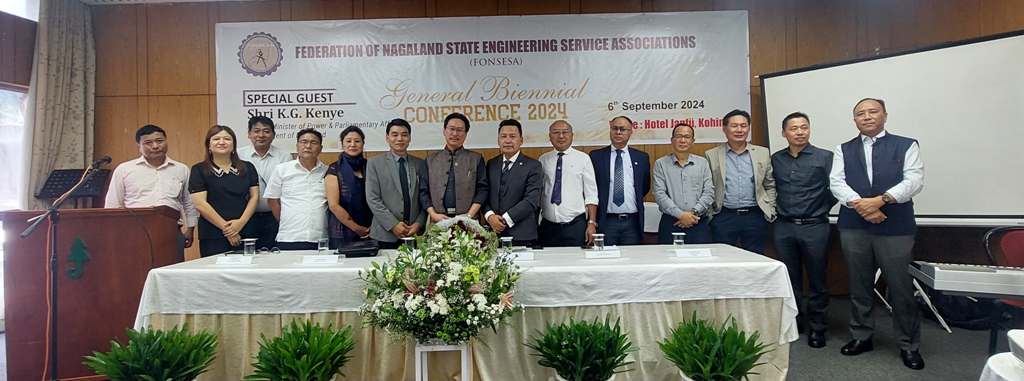Share

KOHIMA — Nagaland Power and Parliamentary Affairs Minister, KG Kenye, said that the unresolved political situation in Nagaland is a major barrier to progress.
“The unsettled, unresolved political issue is taking a toll on overall development, and unless resolved, it will continue to affect future generations”, he said during the Federation of Nagaland State Engineering Service Associations (FONSESA) Biennial Conference on Friday.
He noted that the unresolved political issue discourages private investment and creates uncertainty, leading to missed economic opportunities.
Stating that Nagaland’s alarming 27.8% unemployment rate, the highest in the Northeast, is a symptom of these challenges, he cautioned that the current situation may reach a breaking point, leading to explosive consequences that could be counter-productive to the people's interests.
No state can absorb the employment burden entirely on its own, and the state government machinery is struggling to cope with this growing challenge, he added.
The minister reiterated the Parliamentary Affairs Committee’s (PAC) call for broader engagement in the peace talks. He said that the state government acts as a facilitator, not a negotiating party, and emphasised that any solutions must benefit the “true stakeholders”-- the people of Nagaland.
He also underscored the importance of freeing future generations from the weight of unresolved political issue, allowing them to reach their full potential and compete on a global platform.
Missed opportunities
Kenye went on to state that Nagaland has been unable to fully capitalise on its rich resources, which could otherwise make “every tenth Naga a millionaire.”
He said that the political instability and infrastructural deficiencies in the state have held back the economic potential of its people. The rerouting of Asian Highway No. 1 away from Nagaland and delays in the Trans-Myanmar Highway project, which would have included openings in the eastern part of the state, indicate that there is still uncertainty and indecision from the central authorities towards key projects in the state, the minister said.
Additionally, the state’s stalled waterway project, first proposed about 35 years ago, still remains in “cold storage” for decades despite the state government forwarding it to the Centre, he maintained.
Power and energy sector
Turning to the power sector, Kenye underscored the importance of hydroelectricity for development and lamented the lack of adequate financial support from the central government for such projects in Nagaland.
He emphasised the urgent need for greater support from the central government, public sector undertakings (PSUs), the Ministry of Power, and other relevant agencies to develop Nagaland's power infrastructure.
He expressed concern that despite ample national resources, support has been slow and inadequate, citing the stark contrast between the years-long delay in considering a INR 100 crore funding request for a Nagaland power project and the swift allocation of INR 1 lakh crore for flood relief during a recent prime ministerial visit to Bihar.
Kenye observed that the social and political unrest might be a factor in the inadequate support, adding that it has limited the state’s access to communication and resources.
Untapped potential
Meanwhile, he acknowledged the significant contribution of engineers and technocrats in the state referring to them as the “architects of modern life.” However, he noted that their full potential remains untapped due to the state’s financial constraints.
While Nagaland's engineers and technocrats possess the expertise to drive development, the state’s lack of financial resources has restricted advancements, resulting in a development gap with its neighbour, Assam, in terms of commerce and overall advancement, he said.
In his address, FONSESA President, Hutoi Sema, said that the association stands as a testament to the dedication and hard work of all its members, past and present, and continues to be a hub of professional growth, where ideas are nurtured and collective wisdom is harnessed to bring about positive change.
He noted the immediate challenges faced by Nagaland’s infrastructure, particularly the damage caused by recent flash floods and landslides, and urged engineers to rise to the occasion with innovation and ingenuity.
Sema stressed the importance of continuous learning and leveraging modern technologies, such as AI, machine learning, IoT, and smart infrastructure systems, to address Nagaland's unique topographical challenges and the need for climate-resilient infrastructure.
He also called for greater collaboration between engineers, government departments, and private stakeholders to push for systemic changes and policy reforms.
Highlighting the ongoing challenges faced by the engineering community, he said the proposed Nagaland Engineering Service Rule 2012 (NESR 2012) has been stalled due to crucial issues with the Personnel and Administrative Reforms (P&AR) department.
He also stated that FONSESA and its partner associations are actively seeking a resolution from the state government to ensure their rightful share of IAS seat encadrement and NPSC member appointments.